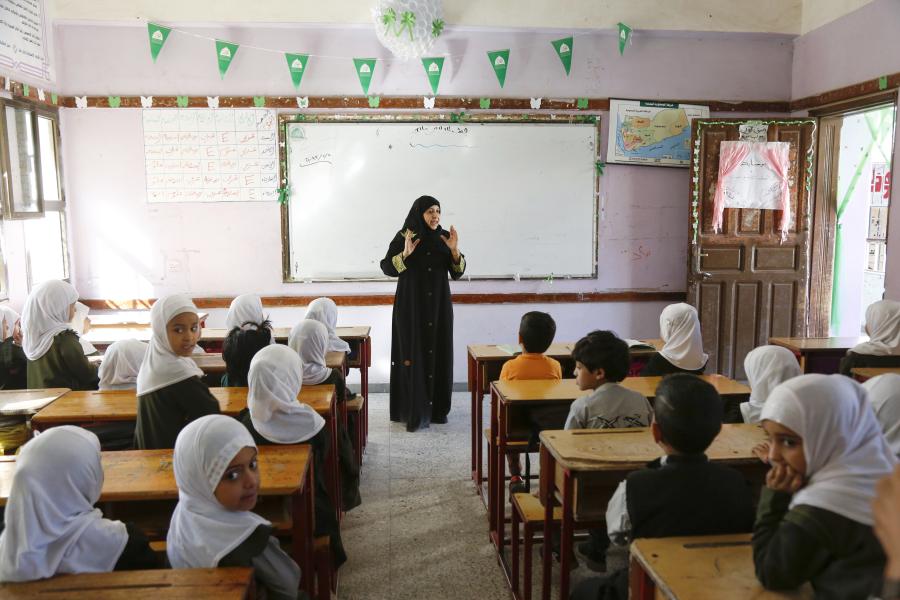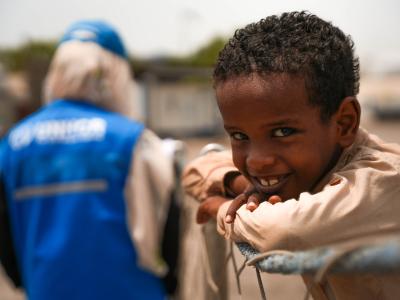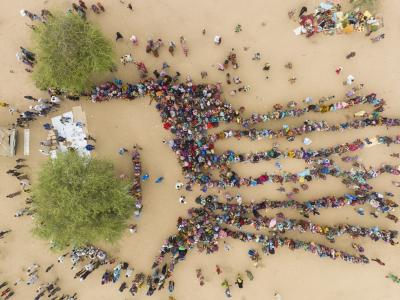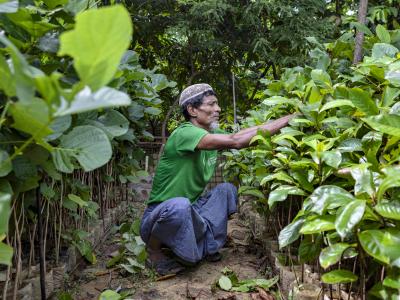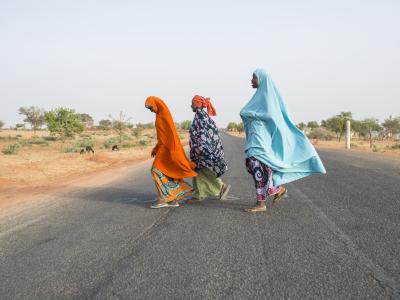Results in 2023
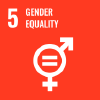
UNHCR aims to protect people who have been forced to flee or who are stateless, helping them in addressing their situation and facilitating durable solutions. Often the most efficient and effective way to achieve those goals is to build on their capacity and skills, by giving individuals and communities an opportunity to organize, participate, and represent their own interests.
In 2023, UNHCR invested in supporting community-based protection initiatives and in the participation of displaced and stateless people in all phases of UNHCR’s annual programming cycle. 39 of UNHCR’s country operations reported data on the extent to which UNHCR supported the participation of refugees and asylum-seekers, with 25 (64%) recording that it was “extensive” and 11 (28%) that it was “moderate”. For internally displaced people, 14 of UNHCR’s operations reported data, with “extensive” support in 10 countries (71%) and “moderate” support in the remaining four.
UNHCR’s country operations used a variety of methodologies to support communities’ engagement in decisions and activities affecting them. 76 operations reported that they conducted participatory assessments in 2023, involving almost 48,000 refugees, asylum-seekers, internally displaced and stateless people. These thematic consultations, carried out by by UNHCR and partner organizations, give people of all ages and characteristics a chance to share their experiences and views and to influence decisions involving them. Examples in 2023 included Ecuador, where UNHCR consulted with 851 individuals, including persons with disabilities and LGBTIQ+ persons; South Sudan, where UNHCR engaged with 3,529 individuals, ensuring the participation of persons with disabilities and minority groups; the Syrian Arab Republic, where 566 focus group discussions targeted 6,138 IDPs, refugees and host community members; and Ukraine, where 113 focus group discussions reached over 1,000 people.
Community structures, such as women’s groups and refugee volunteers, played a critical role in communicating with communities, identifying people at heightened risk, and promoting peaceful co-existence. In Chad, UNHCR trained 3,255 community members representing 217 communities in leadership skills in 2023. In India, 272 community representatives were trained in mapping urgent community needs and identifying people at heightened risk in the community. In Yemen, community-based protection networks identified people at heightened risk and helped them to get the services they needed.
UNHCR worked increasingly with grass-roots organizations, globally and locally. Grant Agreements with organizations led by displaced and stateless people were provided to 107 organizations in 26 countries and UNHCR’s Refugee-led Innovation Fund awarded 27 initiatives across 22 countries. UNHCR supported refugee-led organizations (RLO) in Ecuador, Greece, Indonesia, Kenya, Mexico and Türkiye by facilitating dialogue with the authorities, offering material support and coordination, and by supporting them to build up their own capacity for action.
UNHCR also invested in forcibly displaced and stateless people’s participation in the Global Refugee Forum 2023. Over 320 participants with lived experience of displacement or statelessness, including the members of the global Advisory Board, directly contributed to the debate.
UNHCR continued to strengthen its accountability to affected people through learning opportunities for staff and partners, engagement with community-based organizations, roll-out and scale up of digital communication tools, research and advocacy as well as engagement in inter-agency coordination platforms, with the goal of ensuring that the voices of communities and individuals inform UNHCR programming. (For detailed information, please refer to the Accountability to Affected People focus area.) UNHCR’s global monitoring showed that in 2023, 67% of 132 reporting countries had a multi-channel feedback and response system that was designed based on consultations with displaced and stateless people. This is in line with 2022 results.
UNHCR also invested in women’s representation in leadership and decision-making structures. The overall picture was largely unchanged from 2022, with an average of 40% of reporting countries reaching or surpassing the 50% mark in both refugees/asylum seekers and IDP populations, although there were promising increases in Uganda, Nigeria, and Egypt. In Logone-Birni, Cameroon, women were recognized as members of customary courts, property owners, and village leaders. Women’s involvement in peacebuilding initiatives was strengthened in South Sudan, while in India, men and boys positively engaged in gender equality programming.
UNHCR strove to empower women by enhancing access to schools and higher education, economic inclusion, skills development, and digital inclusion. In Brazil, livelihood programmes bolstered entrepreneurial prospects for indigenous women, while community-based microfinance initiatives helped women’s economic inclusion in Mali. In several countries, women’s committees, female social workers, and female volunteers were instrumental in improving UNHCR’s response to the specific needs of women and girls. In several UNHCR operations, multi-purpose community centres functioned as information hubs and safe spaces for women and girls, providing protection services, assistance, and referrals to other specialized services. UNHCR partnered with Nigeria’s Ministry of Women Affairs and UNFPA to support women’s livelihoods. In the Republic of Moldova, UNHCR and UN Women completed a mapping of local CSOs supporting the refugee response and collaborated with the Gender Task Team on the implementation of the Gender Accountability Framework. In Slovakia, UNHCR collaborated with a women-led organization to operate a community centre, while in Malawi, Mauritania and Ukraine, UNHCR provided technical and financial support to organizations led by forcibly displaced women. UNHCR supported refugee women’s participation in national, regional, and global fora and closely collaborated with several women-led organizations to rally support for the GRF multi-stakeholder pledge on gender equality and the protection from gender-based violence and the Avec Elles pledge.
In line with the UN System-wide Action Plan (UN-SWAP) on Gender Equality and the Empowerment of Women, UNHCR initiated a Global Gender Focal Points network across its operations to improve and disseminate staff knowledge and skills on gender analysis and gender-sensitive programming. Promising and Emerging Practices on Gender Equality from eight countries showcased innovative and transformative approaches. UNHCR advocated for funding for organizations led by displaced women, including through the Women's Peace and Humanitarian Fund (WPHF).
UNHCR provided targeted support to nearly 41,000 older persons and 480,000 persons with disabilities in 2023. UNHCR's support included facilitating access to cash assistance and relief items, relocating vulnerable households to safer areas, providing referrals to health services such as rehabilitation and assistive devices, and assisting refugees in accessing social assistance benefits for disabilities. 15 country operations, compared to only four in 2022, managed to facilitate access to enhanced national systems for refugees with disabilities and older persons, including by supporting individuals in obtaining national disability certifications, therefore enabling equal access to national social protection schemes for persons with disabilities.
Almost 6,000 children with disabilities received community-based support and financial assistance to access education in 10 countries (Algeria, Burundi, Cameroon, Chad, Egypt, Iraq, Moldova, Rwanda and Yemen). In Kigali, UNHCR collaborated with the Rwandan National Association of Deaf Women to launch a pilot Rwandan sign language class for 22 deaf refugees, their families, and community leaders, who underwent training. One graduate secured a job in a school for children with disabilities.
The prevalence of persons with disabilities recorded in UNHCR’s refugee registration system, proGres, was only 3.03% at the end of 2023, far below the estimated 16% of the world population living with a disability. Ukraine accounted for 54% of all newly registered disabilities in 2023.
UNHCR supported grass-roots refugee youth organizations in El Salvador, Ethiopia, the Dominican Republic, Kenya, Mauritania, Morocco, Sudan, South Sudan, Tunisia, Uganda and Yemen. The initiatives supported by UNHCR aimed to bolster advocacy, peacebuilding, social and recreational activities led by refugee youth. In the East and Horn of Africa and the Great Lakes, UNHCR’s Regional Youth Peacebuilding Programme empowered 498 refugee and host community youth with skills, resources and platforms to actively engage in conflict resolution, dialogue, and community-building activities. 314 young people secured paid employment opportunities as a result. On World Youth Day, 4,000 young supporters and refugees took part in the Youth with Refugees Art Contest.
UNHCR carried out an organization-wide stocktaking exercise to assess progress in implementing the recommendations of the 2021 “Global Roundtable on protection and solutions for LGBTIQ+ people in forced displacement” in various areas of its activity. The findings were presented during a follow-up event co-convened with the UN Independent Expert on sexual orientation and gender identity and attended by numerous civil society organizations. UNHCR focused on advocacy, on increased collaboration with LGBTIQ+ organizations and on training its workforce. This included the release of the French and Spanish versions of the LGBTIQ+ online course, completed by more than 1,000 learners by the end of 2023, and other structured learning initiatives such as the training of trainers.
63 operations reported activities targeting or mainstreaming the needs of forcibly displaced LGBTIQ+ persons in 2023. 20 operations facilitated engagement with LGBTIQ+ people, including in participatory assessments. Several operations such as Ecuador, Peru, Guatemala, El Salvador, Moldova, South Africa and Ukraine actively cooperated with grass-roots civil society organizations, on advocacy, training, case management and facilitation of solutions.
Multisectoral monitoring results

67% of reporting countries (132 countries reporting) had a multi-channel feedback and response system that was designed based on consultations with forcibly displaced and stateless people
2022 result: 69% in 144 countries reporting
Core indicators

7.1 Extent participation of forcibly displaced people across programme phases is supported

7.3 Proportion of women participating in leadership/management structures
Age, Gender and Diversity
Age, Gender and Diversity (AGD) approaches remained central in UNHCR’s work, as recorded in the annual “AGD accountability report” and documented practices. An evaluation of the implementation of UNHCR’s AGD policy found numerous good emerging practices such as a stronger use of participatory assessments, the tailoring of accountability mechanisms to meet diverse information and communication needs, and a growing collaboration with organizations with specialized knowledge on disabilities and LGBTIQ+.
Engaging with communities and building trust with their organizations demands significant time and human resources, yet in 2023 underfunding often forced UNHCR’s operations to deprioritize community engagement in favour of more immediate needs. The organizations with which UNHCR sought to engage were hindered by their limited capacity, by legal and financial barriers – such as restrictions on grass-roots organizations' registration, and by the lack of agile tools to channel funds to support their work. UNHCR's ability to regularly consult with communities and collect up-to-date information was often hindered by language barriers or by a lack of access due to security concerns or restrictions imposed by authorities. Discriminatory legislation and social and cultural norms pose additional barriers for engagement of marginalized groups, such as women, persons with disabilities, older people, and LGBTIQ+ persons.
Financial overview
Global expenditure and budget for Community engagement and women's empowerment
$316 million spent against a budget of $678 million
$363 million of unmet needs or 53% of the budget
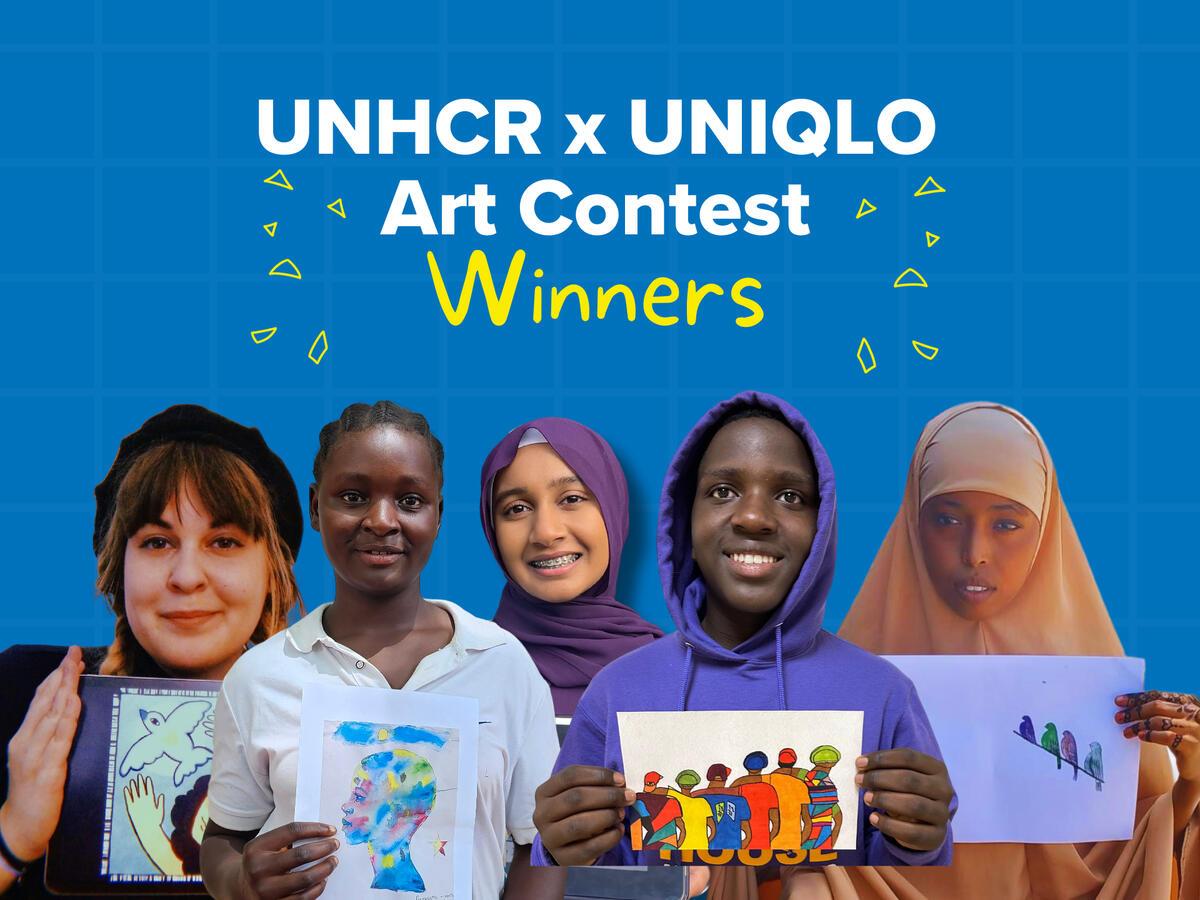

Fast Retailing partners with UNHCR for the 3rd Youth with Refugee Art Contest
Fast Retailing, UNIQLO’s parent company, has been a key partner of UNHCR since 2007, supporting refugees in innovative ways including clothing donations, winter aid, and a self-reliance programme for refugee women in Bangladesh. So far, 425 women have completed sewing training in Cox’s Bazar, with the goal of reaching 1,000 skilled refugees by 2025.
In 2023, Fast Retailing also co-sponsored the Youth with Refugees Art Contest, engaging over 4,000 young people from 130 countries. The company supported art workshops for refugees in Cox’s Bazar, Yokohama, New York, and other cities as part of the competition. The winning t-shirt designs are now on sale in UNIQLO stores in 14 countries, with $3 from every sale going to UNHCR. Additionally, UNIQLO will donate $100,000 to UNHCR as part of the campaign.
